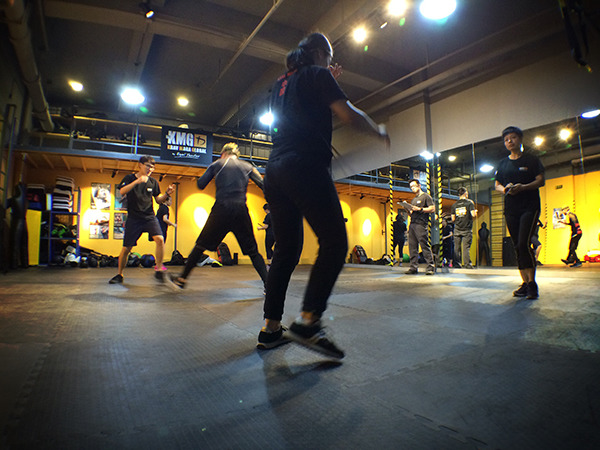
In their regular classes, KMG teaches both striking and defensive techniques, which are both crucial to self-defense. They recently added a conditioning class to help improve other aspects of fight training and development, including coordination, stamina, strength, and explosive power.
Over the past six years, the couple has seen KMG China rise from a small club with about a dozen students into a full training institution with hundreds of active members from increasingly diverse backgrounds. "In the early days, most of our members were men and mostly foreigners living in Beijing," Chan said. "Now we are happy to have more and more women and many more local Chinese who train with us and understand the value of what we do."
The change perhaps has deeper social implications. After all, learning combat, being soaked in sweat, and dotted with bruises is not the most normal thing for women in many Asian countries.
"I heard many Chinese women feel that training in self-defense is not feminine. They feel that it's all about muscles and becoming buff and strong. Although the training naturally includes strength, stamina, and fitness, it has nothing to do with femininity or masculinity. As KMG's chief instructor Eyal Yanilov said, there's no contradiction between being a woman, being feminine and being able to defend yourself. Our system is designed to work for average people, not just athletic people," said Chan.
Wang Jingyi was one of several girls who officially joined KMG's regular classes after the women's self-defense course. Her initial fear that she had bought the membership impulsively was soon dismissed after the first few sessions. Now she is obsessed, training three to four days a week. "For me it's a practical need to learn something to guard against dangers. The training is well designed and each time I see big improvements in myself, especially after practicing with senior members," she said.
Many newcomers still enjoy a fresh experience and the feeling of empowerment, while senior members are gaining a deeper understanding of what they are doing. Drawing on his four years of training with KMG as well as other martial art experiences, Wang Miao thinks Krav Maga is unique.
"I've been practicing Judo and Taekwondo as well. For me, Krav Maga is different from those martial arts, as it helps you develop the right first reaction to attacks," said Wang.
"What's interesting is that the more experienced you are in Krav Maga, the more prudent you become about your actions, as you also think about the consequences of using the skills on attackers," he added.
Creating responsible and respectful practitioners is what KMG China looks to achieve. Rebekah Gong, KMG China's assistant manager, said all interested people are encouraged to participate in a trial class before joining.
In May, KMG China opened its second branch and new headquarters in the Shuangjing area of Beijing's CBD.Chan hoped to see more local Chinese arise as instructors and work with them to spread true Krav Maga culture and value in China in future.


















































